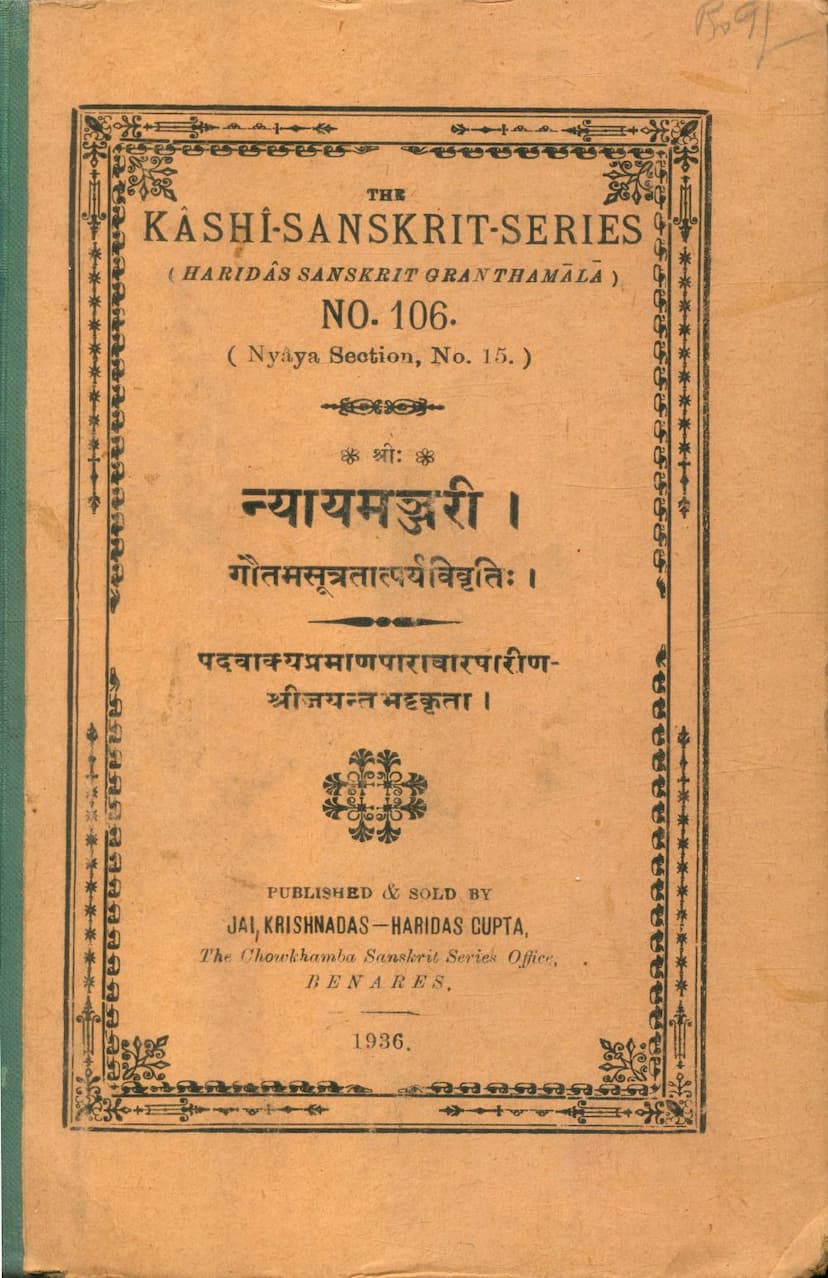Nyayamanjari
Added to library: September 2, 2025

Summary
Here's a comprehensive summary of the Jain text "Nyayamanjari," based on the provided document:
Title: Nyayamanjari (also referred to as Gautam-Sutra-Tatparya-Vivriti) Author: Jayanta Bhatta Editor/Publisher: Pandit Sri Surya Narayana Shukla / Chaukhamba Sanskrit Series Office, Kashi Publication Year: 1936 (Samvat 1993 Vikrami)
Overview:
"Nyayamanjari" is a significant work of Jayanta Bhatta, a renowned philosopher and commentator on the Nyaya school of Indian philosophy. This book serves as a detailed commentary (Vritti) on the Nyaya Sutras of Gautama, aiming to elucidate their underlying principles and the author's unique interpretations. It is considered a pivotal text in the Nyaya tradition, known for its rigorous analysis, critical examination of opposing viewpoints, and masterful defense of Nyaya doctrines.
Key Aspects and Content:
-
Commentary on Nyaya Sutras: The primary purpose of Nyayamanjari is to explain the Nyaya Sutras of Gautama. While not every sutra is explicitly named and explained, the text thoroughly covers the essence and implications of all the sutras, offering a comprehensive understanding of Gautama's system.
-
Comprehensive Scope: The work delves into the sixteen categories (Padarthas) outlined in the Nyaya system: Pramana (Means of valid knowledge), Prameya (Objects of knowledge), Samshaya (Doubt), Prayojana (Aim/Purpose), Drishtanta (Example/Instance), Siddhanta (Established Tenet), Avayava (Members of syllogism), Tarka (Hypothetical Reasoning), Nirnaya (Ascertainment/Conclusion), Vada (Discussion), Jalpa (Argumentation), Vitanda (Sophistical Argumentation), Hetvabhasa (Fallacies of inference), Chala (Equivocation), Jati (Irrelevant Rejoinder), and Nigrahasthana (Grounds for defeat).
-
Detailed Analysis of Pramana (Means of Valid Knowledge): A substantial portion of the book is dedicated to the theory of knowledge (Pramana). Jayanta Bhatta meticulously analyzes each of the accepted means of valid cognition:
- Pratyaksha (Perception): The text elaborates on the definition of perception, emphasizing the involvement of sense organs, the object, and the resulting knowledge. It discusses the nuances of sense-object contact (Sannikarsa) and the conditions for valid perception.
- Anumana (Inference): Jayanta Bhatta provides a thorough explanation of inference, including its structure (the five-membered syllogism - Paksha, Hetu, Udaharana, Upanaya, Nigamana), the role of invariable concomitance (Vyapti), and the various types of inference. He also critically examines the fallacies of inference (Hetvabhasa).
- Upamana (Comparison): The text explains the process of understanding the meaning of an unknown word through its similarity to a known word, based on a description.
- Shabda (Testimony): This section focuses on the validity of verbal testimony, particularly the testimony of reliable sources (Apta), and its role in conveying knowledge, especially about unseen realities like Dharma and liberation.
-
Critique of Opposing Philosophies: A significant strength of Nyayamanjari lies in its robust refutation of doctrines from other philosophical schools, primarily:
- Buddhism: Jayanta Bhatta engages extensively with Buddhist theories, particularly their views on perception (Pratyaksha), inference (Anumana), the theory of momentariness (Kshanabhanga), the concept of Apoha (Negation), and the nature of reality. He meticulously deconstructs their arguments regarding the non-existence of external objects, the nature of consciousness, and the validity of Buddhist Pramanas.
- Mimamsa: The text also addresses and critiques certain tenets of Mimamsa, such as their views on arthapatti (implication) and the nature of Shabda (verbal testimony).
- Other Schools: Arguments from Sankhya, Yoga, and other schools are also addressed and refuted where they diverge from Nyaya principles.
-
Emphasis on Logic and Methodology: Jayanta Bhatta's work is a testament to the systematic and logical approach of the Nyaya school. He uses detailed argumentation, debate techniques (Vada, Jalpa, Vitanda), and the analysis of fallacies (Hetvabhasa, Chala, Jati, Nigrahasthana) to establish the validity of Nyaya epistemology.
-
Author's Contribution: Jayanta Bhatta, believed to be a descendant of the celebrated Chandrapandita and son of Abhinanda, was a scholar of immense repute, described as "Pondit Shri Suryanarayana Shukla." He lived approximately between 840 CE and 900 CE. His work is praised for its clarity, systematic presentation, and the author's profound scholarship in various fields, including grammar, logic, and philosophy.
-
Structure and Organization: The book is organized into twelve "ahnika" (sessions or daily readings), covering the Nyaya principles in a structured manner. The introduction (Bhumika) by the editor provides valuable historical context, discusses the author's lineage, and attempts to establish Jayanta Bhatta's chronological position within Indian philosophy by referencing other major thinkers and texts. The table of contents (Suchipatram) further details the specific topics covered within each section.
Significance:
Nyayamanjari is crucial for understanding the development and nuances of the Nyaya school. It not only presents the core Nyaya tenets but also demonstrates how these principles were debated, defended, and elaborated upon in the face of challenging philosophical arguments from rival traditions. Its detailed critiques of Buddhist philosophy, in particular, make it a vital resource for studying the interaction between these schools. The work is celebrated for its intellectual rigor, literary merit, and its enduring influence on subsequent Nyaya scholars.
In essence, Nyayamanjari is a comprehensive and authoritative exposition of Jayanta Bhatta's understanding and defense of the Nyaya philosophical system, offering deep insights into the nature of reality, knowledge, and the path to liberation.